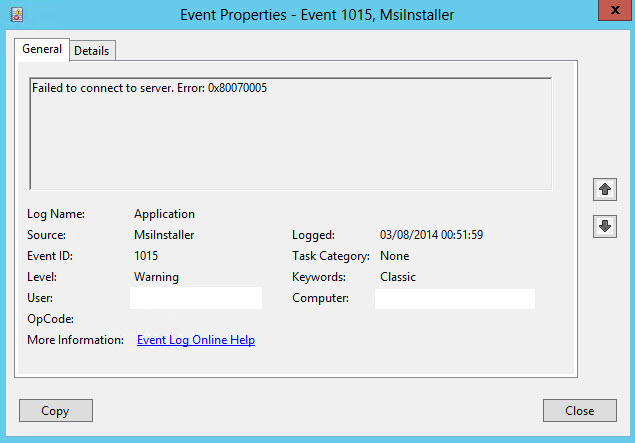Problème
Toutes les minutes, dans les journaux ULS, vous constatez cette erreur:
- Process: Microsoft.Office.Project.Server
- Produit: Project Server
- Catégorie: Project Calculation Service
Timer Task thread crashed System.UnauthorizedAccessException: Access to the registry key 'Global' is denied. at Microsoft.Win32.RegistryKey.Win32Error(Int32 errorCode, String str) at Microsoft.Win32.RegistryKey.InternalGetValue(String name, Object defaultValue, Boolean doNotExpand, Boolean checkSecurity) at Microsoft.Win32.RegistryKey.GetValue(String name) at System.Diagnostics.PerformanceMonitor.GetData(String item) at System.Diagnostics.PerformanceCounterLib.GetPerformanceData(String item) at System.Diagnostics.PerformanceCounterLib.get_CategoryTable() at System.Diagnostics.PerformanceCounterLib.CounterExists(String category, String counter, Boolean& categoryExists) at System.Diagnostics.PerformanceCounterLib.CounterExists(String machine, String category, String counter) at System.Diagnostics.PerformanceCounter.InitializeImpl() at System.Diagnostics.PerformanceCounter..ctor(String categoryName, String counterName, String instanceName, Boolean readOnly) at System.Diagnostics.PerformanceCounter..ctor(String categoryName, String counterName, String instanceName) at Microsoft.Office.Project.Server.BusinessLayer.PcsEngine.PcsPerfCounter.<.ctor>b__0() at System.Lazy`1.CreateValue() --- End of stack trace from previous location where exception was thrown --- at System.Lazy`1.get_Value() at Microsoft.Office.Project.Server.BusinessLayer.PcsEngine.PcsPerfCounter.EnsureSampleDataTask() at Microsoft.Office.Project.Server.BusinessLayer.PcsEngine.PcsTaskWorker.PerformTasksCallback(Object obj) StackTrace: at System.Threading.ExecutionContext.RunInternal(ExecutionContext executionContext, ContextCallback callback, Object state, Boolean preserveSyncCtx) at System.Threading.ExecutionContext.Run(ExecutionContext executionContext, ContextCallback callback, Object state, Boolean preserveSyncCtx) at System.Threading.QueueUserWorkItemCallback.System.Threading.IThreadPoolWorkItem.ExecuteWorkItem() at System.Threading.ThreadPoolWorkQueue.Dispatch()
Solution
Project Server maintient des compteurs de performances le concernant. Il doit donc avoir les droits de le faire. Il faut ajouter le compte qui démarre les services Project Server aux groupes locaux suivants:
- Performance Log Users
- Performance Monitor Users
Il faut ensuite redémarrer les services Project Server quand la file d’attente n’a pas de travail.

